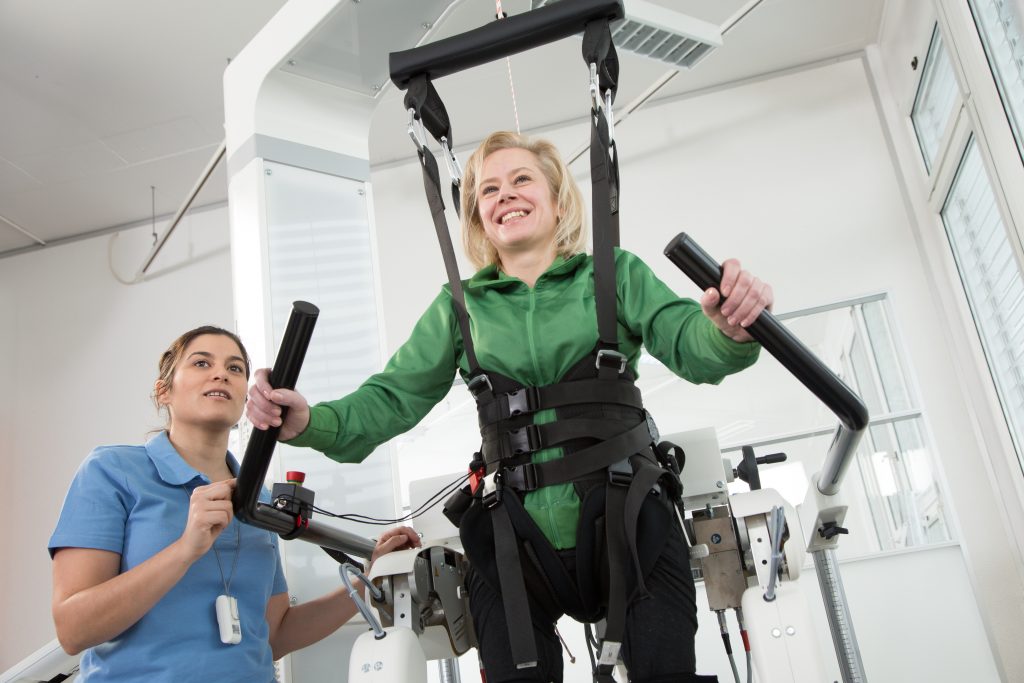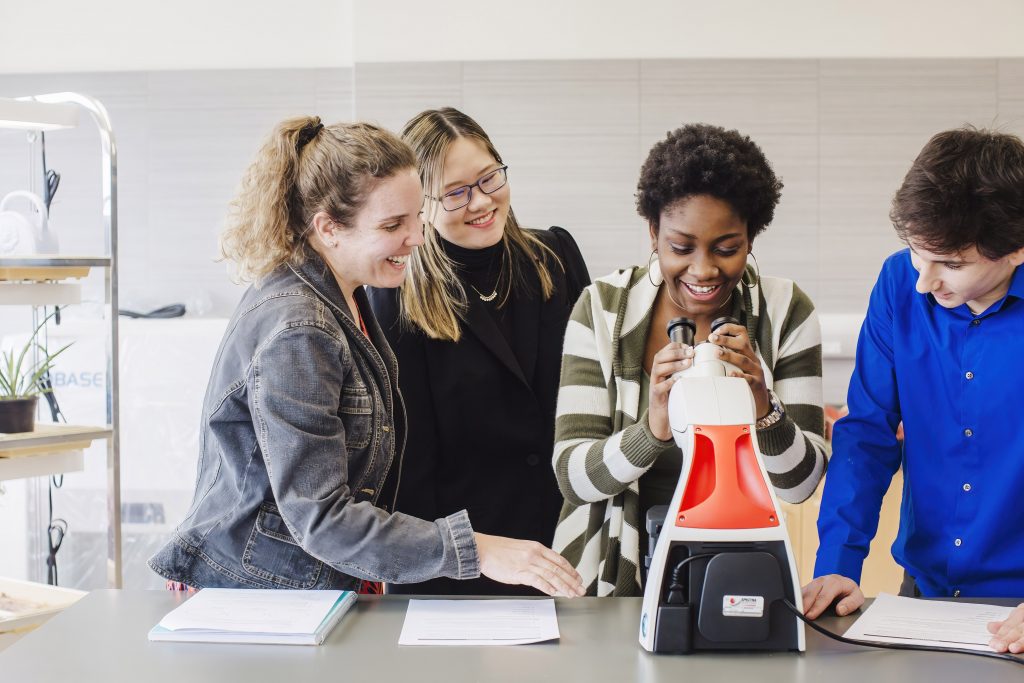It is both a challenging andexciting time to build a career in the health sciences field.
As we saw during the pandemic, there are challenges in healthcare, such as provider shortages, disparities in health outcomes among different community sectors, and an aging population, to name a few.
At the same time, healthcare is constantly evolving with innovative new technologies and treatments being developed every day to improve care. A well-trained and well-educated workforce is essential to keeping pace with these innovations and discovering the next exciting breakthroughs.
In response, Daemen University is transforming the educational experience for students in a range of medical disciplines.
As Western New York’s premier health sciences educator, Daemen now offers more programs for careers in healthcare, with hands-on training in new technologies, and faculty expertise in a range of specialties from orthopedics and wound care, to motor learning and physical therapy.
Daemen offers more programs in the health sciences to align with careers in modern medicine
“We have carefully and purposefully aligned our curriculum in the health sciences with the needs of our community…today and into the future,” explains Michael Brogan, DPT, Ph.D., executive vice president for academic affairs and provost of the university. “No matter what health science major students choose, Daemen offers programs combining high tech with the human touch that set the university apart in Western New York.”
The following are just a few examples of the leading programs at Daemen and how they are making a difference, not only for students in health sciences, but for members of the community as well.

Moving into the future
Millions of people in the United States struggle with mobility issues due to stroke, Parkinson’s disease, traumatic injuries, or other neurological, muscular, and bone-related disorders. In Western New York, there have been limited treatment options for individuals with diminished capacity to move or walk. Until now.
When it opens, Daemen’s Institute for Mobility Innovation and Technology (IMIT) will offer new hope for patients and providers in our community.
The new IMIT will feature state-of-the-art robotic medical devices and assistive technology to help a wide range of people with mobility and walking challenges. The technology and equipment at the institute will aid in range of motion and muscle support to help patients reach treatment goals faster and more comfortably. Equipment includes the latest innovations, such as exoskeleton technology, anti-gravity treadmills, body weight balance systems, vibration therapy, and other specialized equipment.
According to Laura Edsberg, Ph.D., co-director of the IMIT with Brogan, the institute is designed as a collaborative community resource. That means it will offer access for Daemen students, individuals, local health care providers, researchers, other colleges and universities, community-based physical therapists, and clinicians.
“When open, IMIT will offer robotic assistive technology within a university setting, to serve patients, clinicians, and students,” explains Edsberg, who also serves as a professor of natural sciences and is director of Daemen’s Natural and Health Sciences Research Center. “The institute not only strengthens the university’s position as a leader in education, research, and medical treatment, it brings real hope and life-changing opportunities to the community.”
Edsberg notes the IMIT initiative is built on CARE, an acronym for the four pillars of health science curriculum at Daemen – C for clinical work; A for advocacy for patient access and innovation in healthcare; R for research; and E for education. “IMIT offers so many opportunities – for clinicians to treat patients with state-of-the-art equipment; for advocacy on giving patients access to the latest treatments; for research into mobility issues; and of course, for education of students in a hands-on environment,” she concludes. “Our students can then go out into the field to replicate this type of initiative and embrace, encourage, and advocate for the mobility technology, giving patients greater access to care and treatment.”
Located a couple of miles from the Daemen campus, the IMIT will encompass approximately 4,400 square feet of space. The initiative has received tremendous community response with more than a dozen philanthropic foundations contributing support. At this writing, fundraising for the project continues, initial equipment has been purchased, and floor plans are being finalized with an anticipated opening for late fall of 2023.

Helping to fight cancer
Partnership with Roswell Park Comprehensive Cancer Center creates Cytotechnology B.S./M.S. degree program
While the name sounds like something out of a science fiction movie, a relatively new program at Daemen University is helping contribute to the fight against cancer and other diseases.
Cytotechnology, or Cytology as many in the field now call it, is a specialty involving the microscopic interpretation of cells to detect cancer, viral and bacterial infections, and other cell abnormalities. An aging population and other factors have led to a greater need to diagnose medical conditions through lab procedures, and the demand for cytotechnologists continues to grow. Daemen has joined forces with Roswell Park Comprehensive Cancer Center to help meet the demand.
Daemen’s cytotechnology program offers a unique curriculum that allows students to graduate with a bachelor’s degree in biology linked to a master’s degree in cytotechnology in just five years. After completing a degree in biology, students participate in specialized coursework at Roswell Park for 12 months to earn the master’s degree.
“The master’s degree part of the program is very apprentice styled and extremely hands-on for the students,” explains Diane Ramos, Ph.D., chair of the Natural Sciences department and cytotechnology program coordinator at Daemen. “From very early on, they are working with professionals at Roswell Park so that they are ready to begin as cytotechnologists as soon as they pass their boards and receive their license. In fact, of 13 recent graduates, seven were hired by Roswell.”
Daemen Strengthens its Standing as the Area’s premier Health sciences Educator
Roswell Park had reached out to Daemen when the cancer center was looking to start a training program in cytotechnology and build a source of qualified candidates for this important work. Daemen’s reputation for preparing students in the health sciences was part of the reason the hospital sought the partnership. In addition to Roswell Park, Daemen cytotechnology graduates are working in hospitals, clinics, and research laboratories.
“You can think of a cytotechnologist as an assistant to a pathologist, much like a physician assistant is to a medical doctor,” says Ramos. “They are essential to helping get accurate information to oncologists, specialists and physicians to improve patient outcomes.”
There are only two other such cytotechnology programs in New York state in addition to Daemen’s, which boasts this exclusive partnership with Roswell Park. The Daemen degree also includes all of the pre-med requirements if students want to go on to medical school; and graduates who are licensed in New York state are licensed to work in any state in the nation, offering great career flexibility. Average starting salaries in cytotechnology are estimated to be as high as $70,000.
Working together
The Center for Interprofessional Learning & Simulation – CILS – provides real-life education in healthcare collaboration. Anyone who has received medical care recently likely interacted with several different health professionals. That is because the way care is delivered is changing, as different medical specialties collaborate to treat the whole patient. Doctors, nurses, assistants, social workers, and others must work together to deliver the best possible outcomes.
Such collaboration is at the root of Daemen University’s innovative Center for Interprofessional Learning and Simulation, known as CILS. The center allows students – in programs ranging from physical therapy and physician assistant studies, to nursing, social work, and psychological sciences – to learn firsthand how they will interact with other medical professionals in delivering comprehensive patient care.
CILS Director Tony Surace notes the center arose from the shared vision of Dr. Gregg Shutts, former program director of physician assistant studies at Daemen; Elizabeth Wright, dean of the division of health and human services; and Dr. Diane Bessel, department chair of social work and sociology.
“The center was initiated by Daemen faculty who understood the need for team collaboration in healthcare from their own professional experience,” says Surace. “Their collaboration resulted in a state-of-the-art center to simulate real-life scenarios and teach students how different medical disciplines work together.”


Located in Daemen’s Research and Information Commons (RIC), CILS features eight modern examination rooms, a counseling room, and a space for telehealth and face-to-face interprofessional learning experiences. Students are immersed in simulated patient scenarios that mimic real cases. Students must work together to diagnose and treat actors trained to portray patients with particular symptoms, helping to bring the clinical cases to life.
The number of Daemen faculty and students using the center continues to grow as the university develops additional learning opportunities at CILS for other majors. Future plans for the center include providing continuing education courses for area professionals as well as the hosting of community events.
Building on excellence
IMIT, Cytotechnology, and CILS are just the latest examples of Daemen University’s forward-thinking initiatives in the health sciences field. The university has long earned its reputation as a leading educator in healthcare and related disciplines with highly respected programs including:
Physical Therapy Daemen’s physical therapy program is recognized across the country and the university has maintained continuous accreditation by the Commission on Accreditation in Physical Therapy Education (CAPTE) since the program began in 1974. Daemen PT students earn their bachelor’s degree in natural science with a health specialization and their DPT in just six years.
Nursing & Physician Assistant Daemen’s health professions curriculum also includes undergraduate and graduate programs in nursing and physician assistant studies. Students can study primary care
or acute care nursing, as well as graduate studies in executive leadership and nursing education. The PA program prepares graduates to build careers in doctor’s offices, hospitals, family practices, pediatrics, and emergency medicine.
Pre-med Also called pre-professional programs, pre-med includes four semesters of research that takes students to a level of thinking and engagement beyond just coursework to provide a hands-on research experience. Students have opportunities to submit research for publication and faculty can accompany them to present at national research conferences. “They are doing the work – it is their research project – and we have at least one student each year earn publication of their research,” Laura Edsberg points out. “Our hands-on approach helps students in their med school applications, in their essays, and in their interview.”
Social work and psychological sciences Daemen’s social work program is fully accredited by the Council on Social Work Education (CSWE) and the curriculum includes a bachelor’s degree in social work as well as a Master of Social Work (MSW). Students are immersed in community-based projects, engaging coursework and collaboration with faculty on specialized research in social work. Daemen students can also earn a B.A. or B.S. degree in psychology for careers within the mental health field or areas such as law, social work, education, or other health-related professions.
“Daemen University will continue to transform the educational experience for students in our health sciences programs, working closely with faculty and medical professionals for real-life training in unique learning environments,” concludes Brogan. “We are equipping graduates with the knowledge and experience to make a difference in the world of healthcare as highly-skilled, caring professionals.”
Complete details on all of Daemen University’s programs in the health sciences, including updates on the latest initiatives and innovations in education, can be found online at daemen.edu.



















